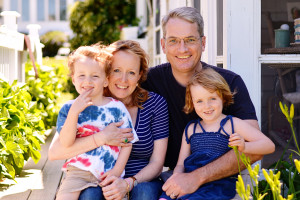
Joanna Shea O’Brien is a writer and mom-of-three based in Winchester who has spent the last ten years as an interviewer for several oral history projects throughout the Northeast. She received an M.F.A. from Columbia University in nonfiction writing and a B.A. from Marymount University, and has worked in communications and research for Senator Edward M. Kennedy, Ambassador Caroline Kennedy, the International Rescue Committee and the Peace Corps. Joanna most recently worked as an oral history interviewer for the Our Marathon WBUR Oral History Project, and she also produces oral histories for individuals, families, and organizations.
Q. So what, exactly, is an oral history?
An oral history is an interview conducted by an oral historian that is recorded and preserved in an institutional or personal archive. The purpose of the interview can be to gather information about a particular historical or current event, or in relation to a specific subject or theme, like the history of Appalachia or a collection of interviews of women who have survived domestic violence. Oral histories are also conducted for corporations and foundations, as well as for families who wish to have their personal history recorded by a professional. My favorite way to describe oral history comes from Mary Marshall Clark, Director for the Columbia Center for Oral History Research: “The great strength of oral history is its ability to record memories in a way that honors the dignity and integrity of ordinary people.”
Q. How did you get interested in oral histories?
On September 11th, 2001, I was a graduate student at Columbia University in New York City. In the weeks that followed, I volunteered to be an interviewer for Columbia’s September 11th Oral History & Narrative Memory Project. For a year and half, I interviewed the firefighters of Engine 47, who had responded to the World Trade Center attacks that morning. When I moved to Boston in 2003, I stayed in touch with the oral history community and tried to incorporate oral history into my communications and writing career. After the Boston Marathon bombing in April 2013, I met oral historian Jayne K. Guberman who was working with Northeastern University’s Our Marathon Boston Bombing Digital Archive to launch an oral history project. I became one of the oral historians for the Our Marathon WBUR Oral History project, where we interviewed nearly 40 men and women who had been directly affected by the bombing. It was an incredible opportunity and one of the greatest professional experiences I’ve had.
Q. Why do you think preserving oral histories is important?
Oral histories broaden the scope of understanding of how people lived in any given time or through any struggle. For example, I interviewed a clinical nurse manager at Spaulding Rehabilitation Hospital, a woman who was watching at the finish line of the Boston Marathon waiting for her son to cross, who witnessed the explosion and then probably experienced one of the worst days of her life emotionally. I heard how she came to care for the very patients she saw injured, and how that helped her healing and also made her a better nurse manager. Her lengthy interview gives a much deeper context and meaning to the words “Boston Strong”, which can run the risk of sounding euphemistic to non-Bostonians. If one listens to her oral history interview, one understands exactly what “strong” means to the survivors, witnesses, and first responders from the Boston Marathon.
Q. What are the most important elements of a “good” oral history?
A good oral historian will elicit stories with sensitive and thought-provoking questions, but without inserting a lot of herself or her opinions or perspectives in the interview. A good oral historian knows that the narrator comes first: not only is the story important, but how he or she chooses to tell it is very important. An oral historian needs to be able to ask the right questions and then sit back and listen.
Q. What is your process when you developing an oral history for someone?
The way to ask good questions is to prepare and do research on the subject, which might mean meeting a few times with the narrator beforehand, reading about the subject’s life or background, and also taking time to establish a rapport and trust. For me personally, working with a team is what makes for excellent oral history. I liked brainstorming questions and subjects with the Northeastern University Our Marathon oral historians, researchers and project directors and I liked attending the interviews with them (either as their recorder or they as mine) because we were so immersed in the stories, and we were able to share ideas and best practices. It was also helpful working with a group because some of the subject matter was so painful to hear, and being with a group who understood what we were processing was really cathartic.
Q. If someone wants to create their own family oral history, can they get in touch with you?
Absolutely! Oral histories are a wonderful way to preserve family memories, providing you with a historical record that spans several generations. I can help you capture the stories that will be cherished for years to come; please feel free to email me at [email protected].
You can listen to the interviews conducted as part of the Our Marathon WBUR Oral History Project by visiting http://marathon.neu.edu/wburoralhistoryproject













Thank you, Ms. Maloney, for sharing Ms. O’Brien’s amazing work! What a gift to the community and participants. I would think the work is very healing for those who have an opportunity to tell their story and be HEARD in a very deep way.